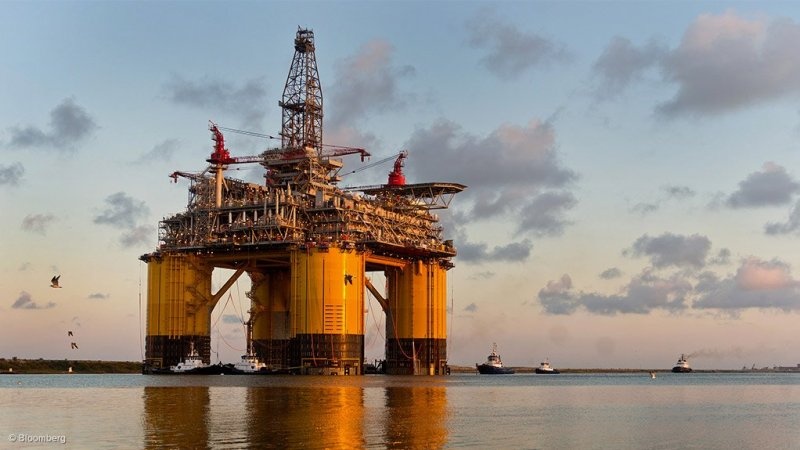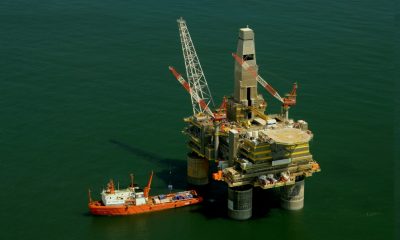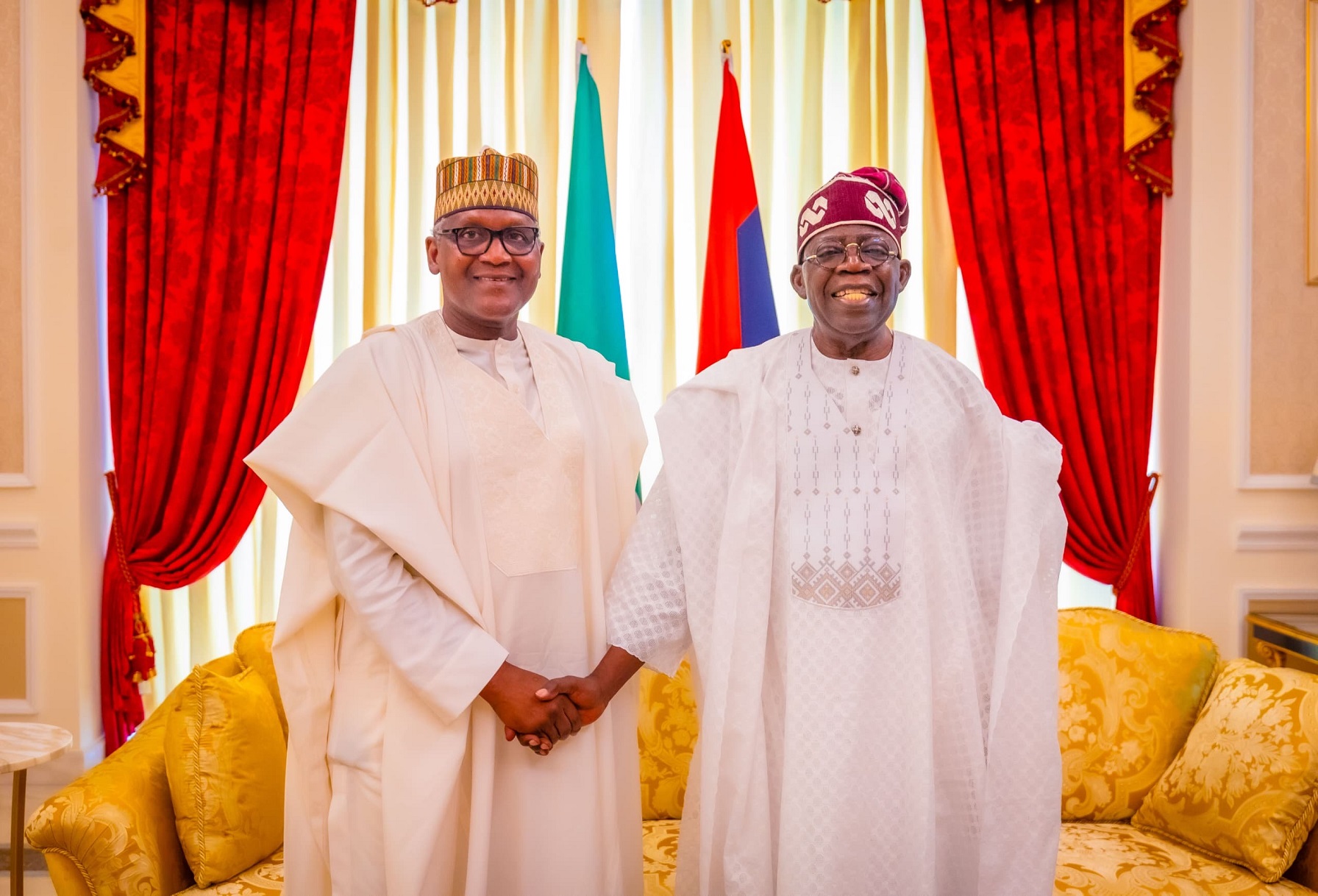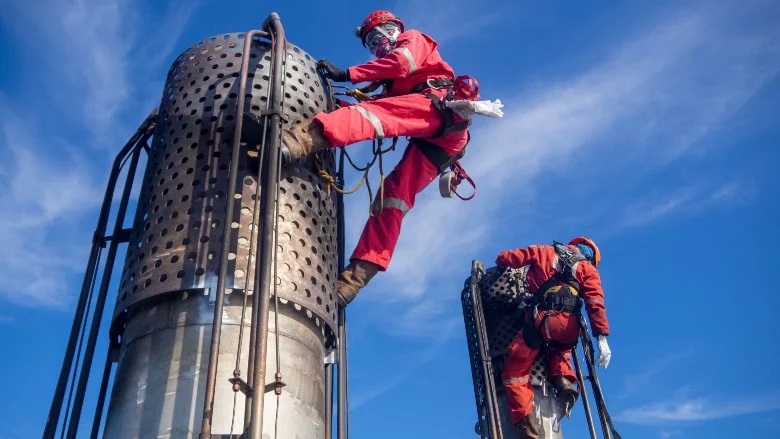Feature/OPED
Despite High Interest, Russia Achieves Little in Oil and Gas Sector in Africa

By Kestér Kenn Klomegâh
According to the World Bank, Russia holds the world’s largest natural gas reserves, the second largest coal reserves, and the eighth largest oil reserves.
Over the past years, Russia has expressed heightened interest in exploring and producing oil and gas in Africa. Emboldened African leaders and industry executives have accepted proposals, several agreements and whatever were signed with Russian companies, but little has been achieved in the sector.
With the rapidly changing geopolitical conditions and economic fragmentation fraught with competition and rivalry, African leaders have to understand that Russia might not heavily invest in the oil and gas sector, not even in the needed infrastructure in this industry.
From our monitoring, research and several interviews with experts especially inside Africa, we can conclude that the Russia-Ukraine crisis has brought into its fold good opportunities.
Understandably, Russia is energy self-sufficient and it does not need to import energy from Africa, it can only act as a fortified gatekeeper. It has been done these several years, primarily to ensure, to a considerable extent, control of Africa’s energy from entering the global market.
The popular opinion now is that potential African producers can take advantage to attract investments required to build infrastructure that would enable them to expand exploration, production and exportation to meet the anticipated increase in demand in Europe.
Reading the daily news feed, Russia’s interest in possible participation in the oil and gas-related projects is perceived by some experts as a bid to either sabotage or control the flow of oil and gas from Africa into Europe. Many more experts have scholarly written about the implications of the Russia-Ukraine crisis, and what that means especially for Africa. The crisis casts a long shadow across Africa.
Despite the geographical distance, there are implications for the need for forging pan-African solidarity and adherence to working towards developing the continent’s natural resources. If this is not done, then Africa will continue importing oil and gas, and it would be increasingly certain, only to sit on the untapped reserves.
During June 2021 interview discussions with NJ Ayuk, Executive Chairman of the African Energy Chamber, a pan-African company that focuses on research, documentation, negotiations and transactions in the energy sector, he expressed the urgent necessity for scaling up Africa’s production capacity in order to achieve universal access to energy.
He further noted the challenging tasks and pointed strongly to the need for a transformative partnership-based strategy, (that requires transparency, good governance and policies that could create a favourable investment climate) and that aims at increasing access to energy for all Africans.
Natural gas, affordable and abundant in Africa, has the power to spark significant job creation and capacity-building opportunities, economic diversification and growth. Sustainable development of African economies can only be attained by the development of local industry – by investing in Africans, building up African entrepreneurs and supporting the creation of indigenous companies. It requires cooperative efforts by Africans.
Can there be a unified approach to collaborating on issues of energy projects in Africa? To this question, NJ Ayuk said that Africa has already made an indelible mark in the oil and gas industry, and Africans must become more accountable, and plan better in the energy sectors. But for some, potential external investors only admire “dating and promising” and, in practical terms, not their priority to invest in the sector. This Russia has exemplified with its decades-old undelivered agreements, not really engaging in the energy sector in Africa.
He rhetorically asked Africa has been receiving aid for nearly six decades, and what good has it done? In order to change the tide, Africans must be responsible. Consider the impact of energy deficiency. Approximately 840 million Africans, mostly in sub-Saharan countries, have no access to electricity. Hundreds of millions have unreliable or limited power at best. Even during normal circumstances, energy poverty should not be the reality for most Africans.
The popular narratives about the prevalence of energy poverty on the continent have to change. We need good governance that creates an enabling environment for widespread economic growth and improved infrastructure. African leaders need an unwavering determination to make Africa work for us, even when there are missteps and things go wrong.
The African Energy Chamber is raising A Banner for African Oil & Gas. It plans to hold an oil and gas conference this October. As part of the conference, its special report titled “State of African Energy Q2 2022 Report” will be presented during the conference. According to the report seen by this author, increasing oil and gas activity and a record number of new discoveries have set the stage for significant industry growth in the second half of 2022.
In Namibia alone, for example, two breakthrough discoveries, Shell’s Graff and Total Energies’ Venus-1X, have opened frontier oil play onshore. Industry experts estimate that Venus-1X may hold recoverable resources of some 3 billion barrels of recoverable oil, making it Sub-Saharan Africa’s largest-ever oil discovery. Namibia, in fact, has led the way in new oil and gas activity this year and is emerging as an exploration hot spot. In northeast Namibia and northwest Botswana, ReconAfrica has licensed operations for the newly discovered 8.5-million-acre Kavango Basin, one of the world’s largest onshore undeveloped basins.
This is great news for our industry, which was hit especially hard by Covid-19 and has struggled to regain momentum. The energy sector was crippled by historically low volumes in 2020 and 2021, creating an even more critical need for new exploration. And Namibia is just one example of the new discoveries being made all over Africa. The Q2 2022 report outlines a number of new developments across the continent.
Eni discovered the Baleine field in Cote d’Ivoire last year, which contains as many as 2 billion barrels of recoverable oil and nearly 2 Tcf of gas offshore. This is a big deal for Côte d’Ivoire, which up until now has been producing about 34,000 barrels of crude per day from four blocks.
In Angola, TotalEnergies is drilling for the first time since 2018 and has executed a sale and purchase agreement with state-owned Sonangol for two blocks in the Kwanza Basin offshore. Other majors, including ExxonMobil, Chevron, BP, and Eni, are active in Angola as well. More than a dozen high-impact wells are predicted in the next 18 months in Libya, Ghana, Mozambique, South Africa, Equatorial Guinea, Morocco, Egypt, and others. Egypt alone has awarded eight oil and gas exploration blocks to Eni, BP, Apex International, Energean, United Energy, Enap Sipetrol, and INA.
And after long delays because of Covid-19, licensing rounds are planned, open, or under evaluation in more than a dozen countries including Angola, Equatorial Guinea, Ghana, Gabon, and Congo. The results are expected to be announced this year. Higher greenfield spending is also forecast as more projects get the green light. In Kenya, for example, large investments are expected in the greenfield onshore development of Tullow’s South Lokichar basin, Turkana County. At an estimated 585 billion barrels, this is widely considered one of the last big conventional onshore projects in the world.
These discoveries and others referenced in the Chamber’s Q2 2022 report are tremendously exciting. And if managed properly, it could make significant progress toward the goal of a just energy transition: alleviating energy poverty, stimulating economic growth, and improving the lives of everyday Africans.
The State of African Energy Q2 2022 Report outlines an unprecedented level of new oil and gas discoveries on the African continent. The simple, staggering fact that more than half of Sub-Saharan Africans lack access to electricity means priority must continue to end energy poverty. With Africa’s population projected to exceed two billion by 2040, generation capacity will need to be doubled by 2030 and multiplied fivefold by 2050.
Oil and gas are Africa’s lifeblood and the foundation for economic development. The future depends on sustaining the longevity of the industry. And with such vast quantities of oil and gas available, we should increase production accordingly and use those resources to benefit Africans.
Africa’s wealth of new oil discoveries is not only a chance to recover some of the devastating losses suffered in the last two years – it represents an opportunity to achieve an energy transition that benefits all Africans. According to the report, increasing oil and gas activity and a record number of new discoveries have set the stage for significant industry growth in the second half of 2022.
Some experts interviewed have expressed their thoughts. Some believe that Europe can look to Africa as a preferred energy supplier. On the other hand, Africa is ready to welcome investors currently pulling out of Russia if they can genuinely invest in developing oil and gas infrastructure which Africa seriously lacks in this industry. That’s a real opportunity, I think, for Africa at this point in time.
Mohammad Sanusi Barkindo, OPEC Secretary General, (before his death in early July) stressed in his last speech that “It is essential if we are to develop new technologies, strengthen the human capacity and remain leaders in innovation so that we can do our part to meet the world’s growing need for energy, shrink our overall environmental footprint, and expand access to underserved communities. Yet the industry is now facing huge challenges along multiple fronts, and these threaten the investment potential now and in the longer term.”
Regrettably, we are seeing global energy cooperation becoming more fragmented. New regional alignments are threatening to reverse years of progress toward creating a more stable and interconnected energy system. We cannot afford to allow multilateral energy cooperation and global energy security to become collateral damage to geopolitics, the OPEC Secretary General said.
As an author of this article, I would acknowledge that for African countries with huge oil and gas reserves, it is necessary to underscore the importance of cooperation in exploring and producing this resource to support the needed sustainable development goals and attempt at becoming more prominent on the global energy stage.
Today, African countries face major challenges. Rapid population growth and the worsening energy crisis are constraining economic growth on the continent. In addition to that, poor transport infrastructure, access of the population to health services, low level of education and food supply insecurity are severely hampering efforts to improve the quality of life throughout Africa.
Our monitoring, research and analysis show that Africa has the fastest-growing population in the world, but half of this population is without energy supply. That is why African leaders have to seriously prioritize the right energy policies to make access to energy the most effective way possible.
Russian Presidential Special Representative for the Middle East and Africa, Mikhail Bogdanov, in an April interview with Interfax news agency, was asked “many people in Europe are convinced that Africa is capable of increasing the production and supplies of gas to Europe instead of Russia’s. In your opinion, how realistic is this?” He explained that “the world is governed by market rules. The reason is the existence of a whole system – consumer markets, traditional suppliers, contracts, not to mention pipelines and oil terminals. In short, this cannot be done in an instant. It will take years to replace supply chains and to build new infrastructure.”
Bogdanov says Africa is beyond any doubt, the continent of the future, both from the point of view of human resources and because it is a storeroom of the world, one of the richest regions. Another issue is that colonial powers, as well as neocolonialists, have never let the Africans take advantage of the treasure which is literally right under their feet. People are working despite the fact that unscrupulous Western competitors are trying to hinder the operations.
President Vladimir Putin addressed the plenary session of the VTB Capital Russia Calling! Investment Forum organized and held by VTB Bank. As usual, the forum brought together from all over the world, business leaders, investment managers and consultants, as well as international experts in the field of the economy and finance. Putin had the opportunity, not only to listen to academics and researchers, sometimes even opposing views of the current developments, but also enjoyed an interactive exchange of opinions with potential investors, and an insight into the mood of business partners both from Russia and abroad.
On Africa, Putin noted at the VTB Capital’s Russia Calling Forum, that many countries had been “stepping up their activities on the African continent” but added that Russia could not cooperate with Africa “as it was in the Soviet period, for political reasons.” For decades, Russia has been looking for effective ways to promote multifaceted ties and new strategies for cooperation in energy, oil and gas, trade and industry in Africa.
But so far, Russia’s investment efforts in the region have been limited which experts attributed to the lack of a system of financing policy projects. While the Russian government is very cautious about making financial commitments, Russia’s financial institutions including banks are not involved in financing policy initiatives in Africa.
At the same time, Russian companies currently have a weak presence in Africa, simply there is no stimulus for efforts to localize the production of equipment and strengthen technological partnerships in the energy sector. Russia contentiously claims the leading position as a supplier and now rapidly diversifying its products at discounted prices to the Asian market.
With the emerging new economic order characterized by competition and rivalry and the additional fact that Russia already has thousands of decades-old undelivered pledges and several bilateral agreements signed which are yet to be implemented with individual countries in the continent, it is simply logical that Africans should not expect much in this oil and gas (energy) sector from the Russian Federation.
Feature/OPED
How Christians Can Stay Connected to Their Faith During This Lenten Period

It’s that time of year again, when Christians come together in fasting and prayer. Whether observing the traditional Lent or entering a focused period of reflection, it’s a chance to connect more deeply with God, and for many, this season even sets the tone for the year ahead.
Of course, staying focused isn’t always easy. Life has a way of throwing distractions your way, a nosy neighbour, a bus driver who refuses to give you your change, or that colleague testing your patience. Keeping your peace takes intention, and turning off the noise and staying on course requires an act of devotion.
Fasting is meant to create a quiet space in your life, but if that space isn’t filled with something meaningful, old habits can creep back in. Sustaining that focus requires reinforcement beyond physical gatherings, and one way to do so is to tune in to faith-based programming to remain spiritually aligned throughout the period and beyond.
On GOtv, Christian channels such as Dove TV channel 113, Faith TV and Trace Gospel provide sermons, worship experiences and teachings that echo what is being practised in churches across the country.
From intentional conversations on Faith TV on GOtv channel 110 to true worship on Trace Gospel on channel 47, these channels provide nurturing content rooted in biblical teaching, worship, and life application. Viewers are met with inspiring sermons, reflections on scripture, and worship sessions that help form a rhythm of devotion. During fasting periods, this kind of consistent spiritual input becomes a source of encouragement, helping believers stay anchored in prayer and mindful of God’s presence throughout their daily routines.
To catch all these channels and more, simply subscribe, upgrade, or reconnect by downloading the MyGOtv App or dialling *288#. You can also stream anytime with the GOtv Stream App.
Plus, with the We Got You offer, available until 28th February 2026, subscribers automatically upgrade to the next package at no extra cost, giving you access to more channels this season.
Feature/OPED
Turning Stolen Hardware into a Data Dead-End

By Apu Pavithran
In Johannesburg, the “city of gold,” the most valuable resource being mined isn’t underground; it’s in the pockets of your employees.
With an average of 189 cellphones reported stolen daily in South Africa, Gauteng province has become the hub of a growing enterprise risk landscape.
For IT leaders across the continent, a “lost phone” is rarely a matter of a misplaced device. It is frequently the result of a coordinated “snatch and grab,” where the hardware is incidental, and corporate data is the true objective.
Industry reports show that 68% of company-owned device breaches stem from lost or stolen hardware. In this context, treating mobile security as a “nice-to-have” insurance policy is no longer an option. It must function as an operational control designed for inevitability.
In the City of Gold, Data Is the Real Prize
When a fintech agent’s device vanishes, the $300 handset cost is a rounding error. The real exposure lies in what that device represents: authorised access to enterprise systems, financial tools, customer data, and internal networks.
Attackers typically pursue one of two outcomes: a quick wipe for resale on the secondary market or, far more dangerously, a deep dive into corporate apps to extract liquid assets or sellable data.
Clearly, many organisations operate under the dangerous assumption that default manufacturer security is sufficient. In reality, a PIN or fingerprint is a flimsy barrier if a device is misconfigured or snatched while unlocked. Once an attacker gets in, they aren’t just holding a phone; they are holding the keys to copy data, reset passwords, or even access admin tools.
The risk intensifies when identity-verification systems are tied directly to the compromised device. Multi-Factor Authentication (MFA), widely regarded as a gold standard, can become a vulnerability if the authentication factor and the primary access point reside on the same compromised device. In such cases, the attacker may not just have a phone; they now have a valid digital identity.
The exposure does not end at authentication. It expands with the structure of the modern workforce.
65% of African SMEs and startups now operate distributed teams. The Bring Your Own Device (BYOD) culture has left many IT departments blind to the health of their fleet, as personal devices may be outdated or jailbroken without any easy way to know.
Device theft is not new in Africa. High-profile incidents, including stolen government hardware, reinforce a simple truth: physical loss is inevitable. The real measure of resilience is whether that loss has any residual value. You may not stop the theft. But you can eliminate the reward.
Theft Is Inevitable, Exposure is Not
If theft cannot always be prevented, systems must be designed so that stolen devices yield nothing of consequence. This shift requires structured, automated controls designed to contain risk the moment loss occurs.
Develop an Incident Response Plan (IRP)
The moment a device is reported missing, predefined actions should trigger automatically: access revocation, session termination, credential reset and remote lock or wipe.
However, such technical playbooks are only as fast as the people who trigger them. Employees must be trained as the first line of defence —not just in the use of strong PINs and biometrics, but in the critical culture of immediate reporting. In high-risk environments, containment windows are measured in minutes, not hours.
Audit and Monitor the Fleet Regularly
Control begins with visibility. Without a continuous, comprehensive audit, IT teams are left responding to incidents after damage has occurred.
Opting for tools like Endpoint Detection and Response (EDR) allows IT teams to spot subtle, suspicious activities or unusual access attempts that signal a compromised device.
Review Device Security Policies
Security controls must be enforced at the management layer, not left to user discretion. Encryption, patch updates and screen-lock policies should be mandatory across corporate devices.
In BYOD environments, ownership-aware policies are essential. Corporate data must remain governed by enterprise controls regardless of device ownership.
Decouple Identity from the Device
Legacy SMS-based authentication models introduce avoidable risk when the authentication channel resides on the compromised handset. Stronger identity models, including hardware tokens, reduce this dependency.
At the same time, native anti-theft features introduced by Apple and Google, such as behavioural theft detection and enforced security delays, add valuable defensive layers. These controls should be embedded into enterprise baselines rather than treated as optional enhancements.
When Stolen Hardware Becomes Worthless
With POPIA penalties now reaching up to R10 million or a decade of imprisonment for serious data loss offences, the Information Regulator has made one thing clear: liability is strict, and the financial fallout is absolute. Yet, a PwC survey reveals a staggering gap: only 28% of South African organisations are prioritising proactive security over reactive firefighting.
At the same time, the continent is battling a massive cybersecurity skills shortage. Enterprises simply do not have the boots on the ground to manually patch every vulnerability or chase every “lost” terminal. In this climate, the only viable path is to automate the defence of your data.
Modern mobile device management (MDM) platforms provide this automation layer.
In field operations, “where” is the first indicator of “what.” If a tablet assigned to a Cape Town district suddenly pings on a highway heading out of the city, you don’t need a notification an hour later—you need an immediate response. An effective MDM system offers geofencing capabilities, automatically triggering a remote lock when devices breach predefined zones.
On Supervised iOS and Android Enterprise devices, enforced Factory Reset Protection (FRP) ensures that even after a forced wipe, the device cannot be reactivated without organisational credentials, eliminating resale value.
For BYOD environments, we cannot ignore the fear that corporate oversight equates to a digital invasion of personal lives. However, containerization through managed Work Profiles creates a secure boundary between corporate and personal data. This enables selective wipe capabilities, removing enterprise assets without intruding on personal privacy.
When integrated with identity providers, device posture and user identity can be evaluated together through multi-condition compliance rules. Access can then be granted, restricted, or revoked based on real-time risk signals.
Platforms built around unified endpoint management and identity integration enable this model of control. At Hexnode, this convergence of device governance and identity enforcement forms the foundation of a proactive security mandate. It transforms mobile fleets from distributed risk points into centrally controlled assets.
In high-risk environments, security cannot be passive. The goal is not recovery. It is irrelevant, ensuring that once a device leaves authorised hands, it holds no data, no identity leverage, and no operational value.
Apu Pavithran is the CEO and founder of Hexnode
Feature/OPED
Daniel Koussou Highlights Self-Awareness as Key to Business Success

By Adedapo Adesanya
At a time when young entrepreneurs are reshaping global industries—including the traditionally capital-intensive oil and gas sector—Ambassador Daniel Koussou has emerged as a compelling example of how resilience, strategic foresight, and disciplined execution can transform modest beginnings into a thriving business conglomerate.
Koussou, who is the chairman of the Nigeria Chapter of the International Human Rights Observatory-Africa (IHRO-Africa), currently heads the Committee on Economic Diplomacy, Trade and Investment for the forum’s Nigeria chapter. He is one of the young entrepreneurs instilling a culture of nation-building and leadership dynamics that are key to the nation’s transformation in the new millennium.
The entrepreneurial landscape in Nigeria is rapidly evolving, with leaders like Koussou paving the way for innovation and growth, and changing the face of the global business climate. Being enthusiastic about entrepreneurship, Koussou notes that “the best thing that can happen to any entrepreneur is to start chasing their dreams as early as possible. One of the first things I realised in life is self-awareness. If you want to connect the dots, you must start early and know your purpose.”
Successful business people are passionate about their business and stubbornly driven to succeed. Koussou stresses the importance of persistence and resilience. He says he realised early that he had a ‘calling’ and pursued it with all his strength, “working long weekends and into the night, giving up all but necessary expenditures, and pressing on through severe setbacks.”
However, he clarifies that what accounted for an early success is not just tenacity but also the ability to adapt, to recognise and respond to rapidly changing markets and unexpected events.
Ambassador Koussou is the CEO of Dau-O GIK Oil and Gas Limited, an indigenous oil and natural gas company with a global outlook, delivering solutions that power industries, strengthen communities, and fuel progress. The firm’s operations span exploration, production, refining, and distribution.
Recognising the value of strategic alliances, Koussou partners with business like-minds, a move that significantly bolsters Dau-O GIK’s credibility and capacity in the oil industry. This partnership exemplifies the importance of building strong networks and collaborations.
The astute businessman, who was recently nominated by the African Union’s Agenda 2063 as AU Special Envoy on Oil and Gas (Continental), admonishes young entrepreneurs to be disciplined and firm in their decision-making, a quality he attributed to his success as a player in the oil and gas sector. By embracing opportunities, building strong partnerships, and maintaining a commitment to excellence, Koussou has not only achieved personal success but has also set a benchmark for future generations of African entrepreneurs.
His journey serves as a powerful reminder that with determination and vision, success is within reach.
-

 Feature/OPED6 years ago
Feature/OPED6 years agoDavos was Different this year
-
Travel/Tourism10 years ago
Lagos Seals Western Lodge Hotel In Ikorodu
-

 Showbiz3 years ago
Showbiz3 years agoEstranged Lover Releases Videos of Empress Njamah Bathing
-

 Banking8 years ago
Banking8 years agoSort Codes of GTBank Branches in Nigeria
-

 Economy3 years ago
Economy3 years agoSubsidy Removal: CNG at N130 Per Litre Cheaper Than Petrol—IPMAN
-

 Banking3 years ago
Banking3 years agoSort Codes of UBA Branches in Nigeria
-

 Banking3 years ago
Banking3 years agoFirst Bank Announces Planned Downtime
-

 Sports3 years ago
Sports3 years agoHighest Paid Nigerian Footballer – How Much Do Nigerian Footballers Earn




















